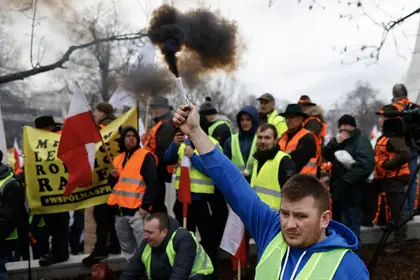Thousands of angry farmers could be seen blowing horns, throwing smoke bombs and firecrackers and lighting fires outside the prime minister’s office in Warsaw in the latest escalation over the Polish-Ukrainian grain dispute, as reported by AFP.
However, the fact that Ukraine already conceded to the demands could indicate that political infighting is ultimately at play beneath the persisting voices against Ukrainian farm imports.
JOIN US ON TELEGRAM
Follow our coverage of the war on the @Kyivpost_official.
“I want to produce healthy food but we’re importing products lower in quality than ours with which we can’t compete in terms of price,” said protester Jan Kepa, who has a farm in southwestern Poland.
“We still have hope but we’ve been protesting for over a month and so far there’s been no satisfying solution for us,” he told AFP.
However, Ukraine’s Deputy Economy Minister and Trade Representative Taras Kachka told the Financial Times today – prior to the latest escalations – that Kyiv is ready to accept restrictions on farm imports into the EU if the bloc bans Russian farm imports as well, where some Lithuanian farmers said the latter has had a larger impact on the local market.
Far-right elements at the protest
An anti-Ukrainian slogan that read “The End to Ukrainization” could be spotted on top of a van at the ongoing protest.
The prominence of Confederation Liberty and Independence, a Polish far-right group, at the protest could also mean that Ukrainian imports might simply be a facade for the group’s agenda.

Poland Planning Defense Industry Delegation Visit to Ukraine - Defense Chief
The group, a staunch EU opposition that holds xenophobic views, has been considered radical right by some, and they are also known for their stance against Tusk.
“We want to criticize Donald Tusk’s government for the Byzantine rule it is building, that is, for appointing a record number of government members,” said Krzysztof Bosak, a lawmaker from Confederation Liberty and Independence in a previous comment.
The official statement released by the party today about the farmers’ protest also shed light on the group’s stance.
“We remind you once again what we are calling for, or rather what farmers are calling for, and with what we stand in solidarity. This means introducing a national embargo on agri-food products from Ukraine and other countries outside the European Union.
“We do not agree with Prime Minister Tusk’s attempt to redirect this discussion to suddenly call on Brussels to embargo Russian products,” it read, even though Tusk had publicly stated that he was mulling the decision to ban Ukrainian imports.
While some of the farmers’ concerns could be justified, the latest developments have demonstrated outside forces could potentially be at play.
Current developments
The farmers’ protest escalated on Feb. 20 and led to an unprecedented border blockade with Ukraine over what the former called excessive competition from Ukrainian farm imports.
Tusk said last week that the government was mulling a temporary closure of the border with Ukraine for goods.
On Monday, he called on the European Union to impose full sanctions on food and agricultural imports from Russia and Belarus – a proposal backed by Ukraine.
Tusk said EU-wide sanctions would make it possible to “more effectively protect the EU’s agricultural and food markets” and “fully open up the possibilities of exporting Ukrainian produce ... to third countries.”
Tusk is due to hold talks with Polish farmers on Saturday.
A recent Kyiv Post Op-Ed covered the farmers’ protest developments in detail.
You can also highlight the text and press Ctrl + Enter










